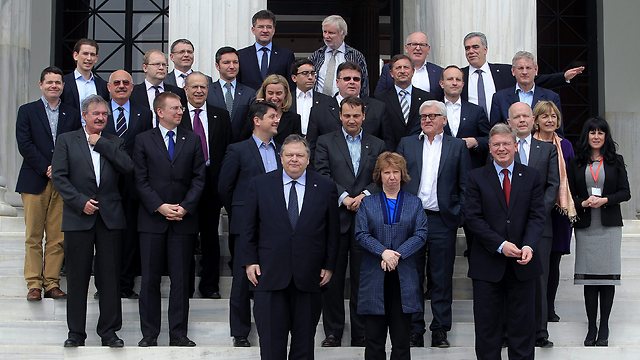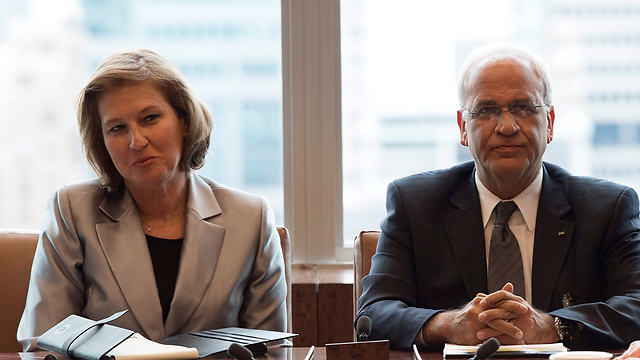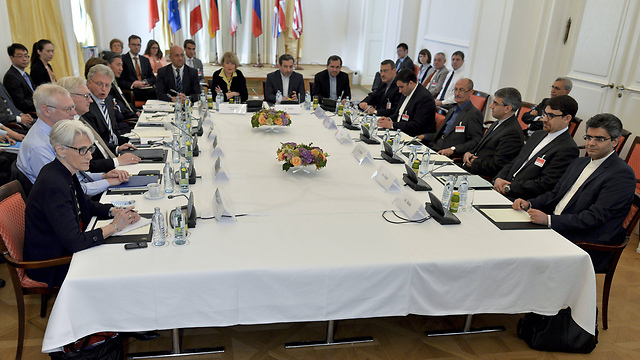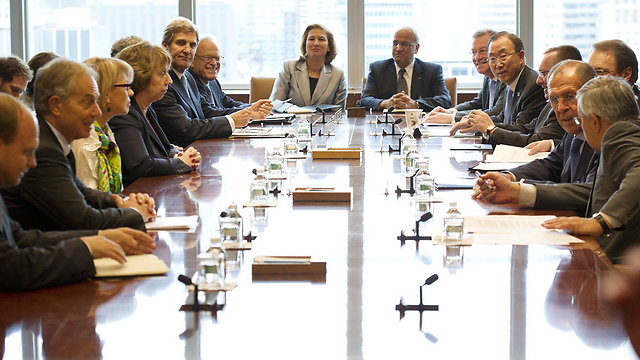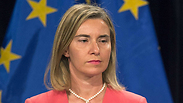
EU to Israel: Halt forced population transfers
A meeting of EU foreign ministers blasts Israel for what it says are actions that 'seriously threaten the two-state solution', while embracing a new international peace plan that would bring Israel and the Palestinians back to the negotiating table.
The foreign ministers of the European Union on Monday discussed a new plan to push Israeli-Palestinian peace, and did not hold back on listing what they perceived to be obstacles to peace, including what they termed "forced transfers", settlements, and the building of the "separation barrier" beyond the green line.
A list of decisions made at the meeting stated that among other things, the EU "calls on Israeli authorities to halt plans for forced transfer of population and demolition of Palestinian housing and infrastructure in the Susya and Abu Nwar communities."
The decision went on to state that the EU "reiterates its strong opposition to Israel's settlement policy and actions taken in this context, such as building the separation barrier beyond the 1967 line, demolitions and confiscation – including of EU funded projects – evictions, forced transfers including of Bedouins, illegal outposts, settler violence and restrictions of movement and access."
The statement concluded that "these actions seriously threaten the two-state solution."
The ministers also condemned recent violence emanating from Gaza: "Recent rocket fire by militant groups is unacceptable and underlines again the danger of escalation," they warned.
Peace Proposal
The same meeting saw EU diplomats discuss the new push towards Israeli-Palestinian peace through international organizations.
"The EU, notably through the action of its recently appointed Special Representative for the Middle East Peace Process, will work actively on a renewed multilateral approach to the peace process in consultation with all relevant stakeholders, including partners in the Quartet, notably the US, in the region and the United Nations Security Council," read the document.
Building on a French proposal, the EU foreign ministers agreed to create an "international support group" more than a year after the collapse of a US-brokered peace push envisaging a Palestinian state co-existing with Israel. The EU wants to open the door to more countries to get involved.
French Foreign Minister Laurent Fabius recently presented the Arab League with a detailed plan to renew peace talks between Israel and the Palestinians.
The plan stipulates the formation of a Palestinian state in the pre-1967 lines, with swaps of mutually agreed upon lands similar in size, while taking into account Israel's security needs.
France has said that if a two-state solution was not reached by the end of the allotted 18 month period of negotiations, France would announce its official recognition of the State of Palestine.
'Diplomacy works'
"This week tells us that diplomacy in the long run can deliver," EU foreign policy chief Federica Mogherini said, referring to the July 14 deal in which Iran agreed to curb its disputed nuclear program in return for an end to sanctions.
The EU foreign ministers' plan envisages obtaining formal approval for the so-called support group at the UN General Assembly in New York in September, then a UN Security Council resolution to set parameters for a peace deal.
Deep internal divisions within the 28-nation EU over Middle East policy, which limit its ability to take an active role, are among the reasons for seeking an international coalition.
Participants in the Iran nuclear accord were world powers Russia, China, the United States, Britain, France and Germany. EU diplomats see a chance to involve many more countries than those in the Middle East Quartet – the United States, the United Nations, the European Union and Russia – that has promoted Israeli-Palestinian peacemaking with little practical effect.
Under the EU proposal, the permanent members of the UN Security Council, the larger European economies including Spain and Italy, and Arab nations could play a bigger role.
Mogherini, who met with Prime Minister Benjamin Netanyahu and Palestinian President Mahmoud Abbas in May, sees a chance for EU diplomacy in the absence of a new diplomatic initiative from Washington as President Barack Obama approaches the end of his final term.
While the central players in the nuclear negotiations were Iran and the United States, senior EU officials played a central role in mediating negotiations, becoming the unsung heroes of the deal and giving EU diplomats confidence to do more abroad.
"The (Israeli-Palestinian) peace process is at a standstill. The situation is bad. Europe should help both parties to take steps to overcome the impasse," French Foreign Minister Laurent Fabius said.











